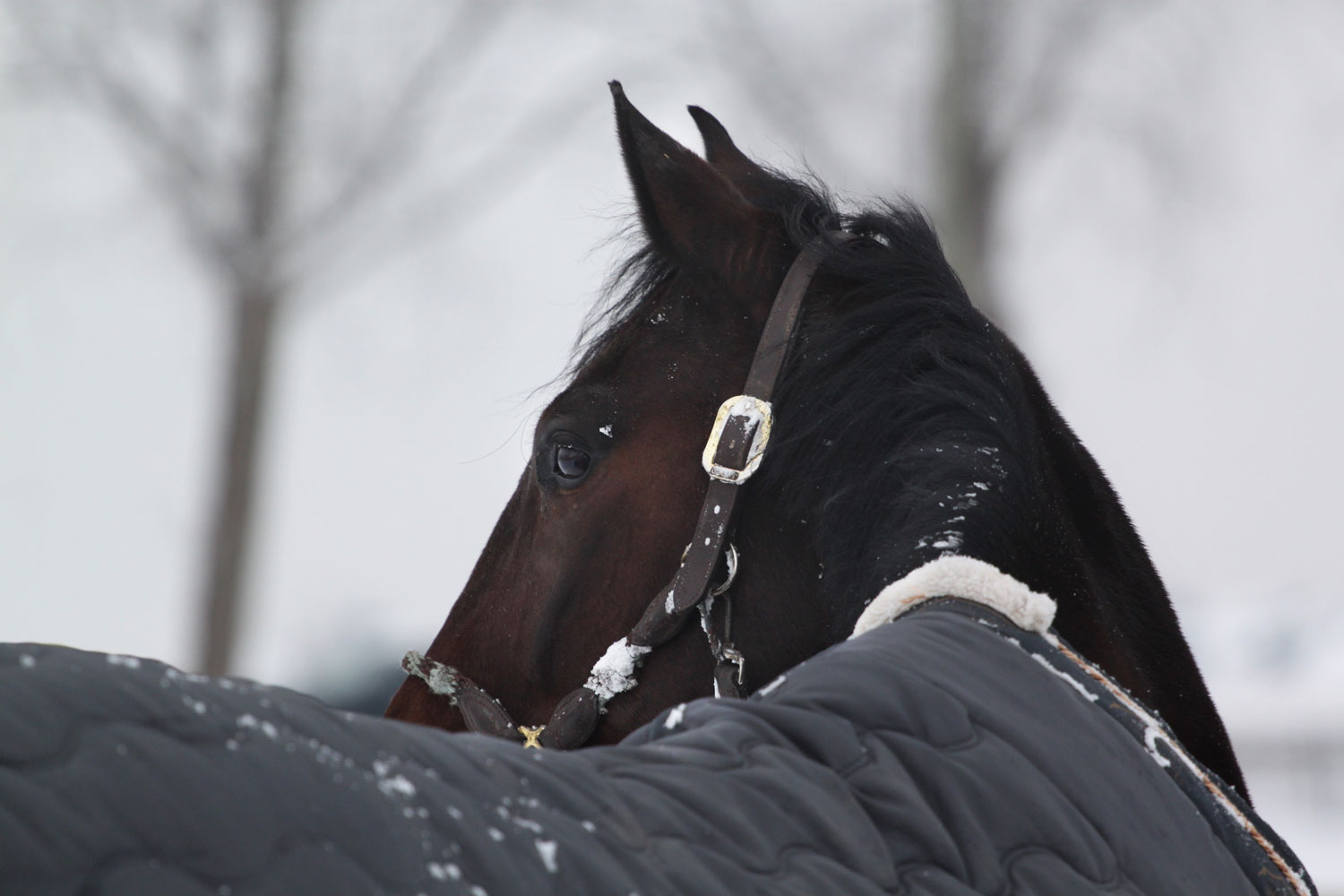When it comes to a horse’s health, nothing is more important than nutrition. It plays a role in almost everything—weight, body condition, attitude, energy, immunity, hoof health, and even mental focus. Therefore, appropriate and adequate nutrition represents a central factor in overall wellness in horses.
Nutritional support becomes even more vital to competition horses due to the lifestyle stresses and physical demands they undergo. However, those same stressors decrease gastrointestinal function, which can lead to an inability to fully absorb the nutrients available in even the best feed program.
High-intensity work, coupled with traveling and irregular feeding patterns, can easily cause cortisol levels to soar, among other issues. Raised cortisol contributes to immune dysfunction and pro-inflammatory responses within the gut, which can ultimately lead to ulceration and other GI disease, which decreases the gut’s ability to fully absorb nutrients. And those potential deficiencies, in turn, can negatively affect hoof quality, body condition, mental focus, physical ability, and more.
Here’s how performance can stress digestive health and contribute to nutritional deficiencies in horses. And then, how those nutritional deficiencies can decrease performance. Learn how you can help your clients maximize nutrition in their performance horses.
Common Causes of Nutrient Deficiency or Malnutrition in Horses
The various stressors afflicting performance horses can predispose them to gastrointestinal conditions such as gastric ulceration, colonic ulceration, and disruption to the microbiota. All of this, in turn, may lead to weight loss, a dull coat, intestinal discomfort, diarrhea, hoof health issues, malnutrition, and decreased performance.
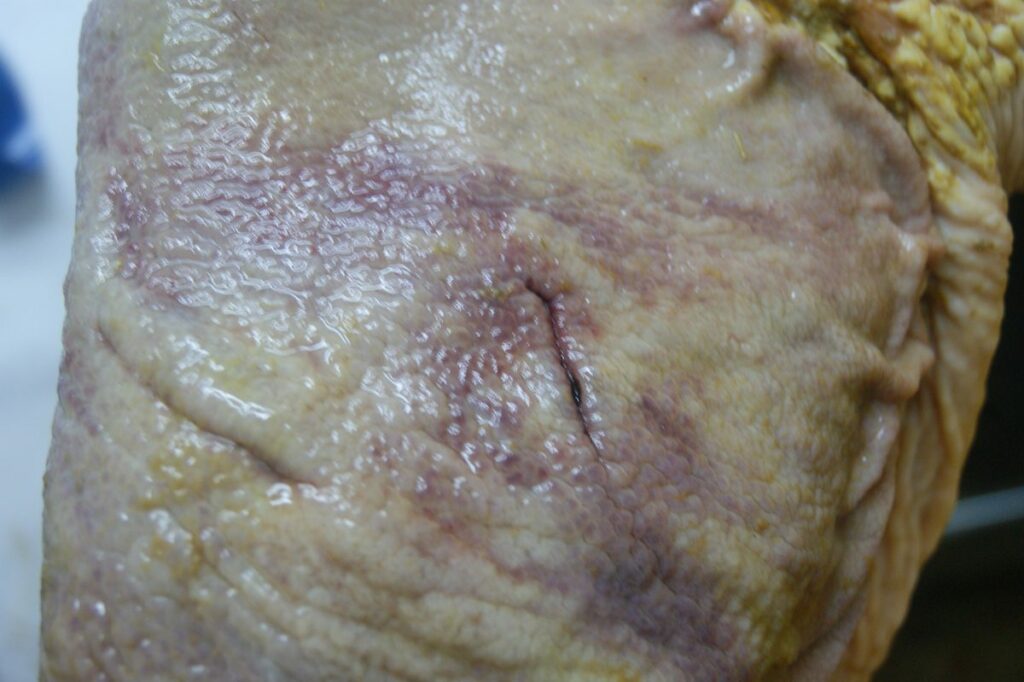
Gastric Ulcers
Why They Occur:
The horse has a small stomach that relies on a steady ingestion of grass (or other forage) to maintain optimal function and health. If the stomach is left empty for long stretches of time on a daily basis, then it becomes susceptible to stomach ulcers. Grain feeds, training and traveling, and generally stress in horses have also been linked to the development of gastric ulcers.
How They Affect Nutrition:
Equine Gastric Ulcer Syndrome is clearly the most common disease condition affecting the stomach of the horse. In symptomatic horses, inappetence, difficulty maintaining weight or weight loss, recurrent colic, and changes in hair coat, may result.
When the stomach isn’t functioning as it should, or is being treated with PPIs to resolve ulceration, ingesta isn’t broken down properly before moving on through the digestive tract. Nutrients can’t be fully absorbed in the small intestine, so the horse can’t fully utilize feed. Also, undigested starch reaches the hindgut where it may lead to microbial imbalances and dysbiosis, disrupting hindgut health.
How They Affect Performance:
Gastric ulcers also cause changes in behavior, including reluctance to training, and underperformance. Abdominal pain and inflammation make it difficult for the horse to give its all in training and competition.
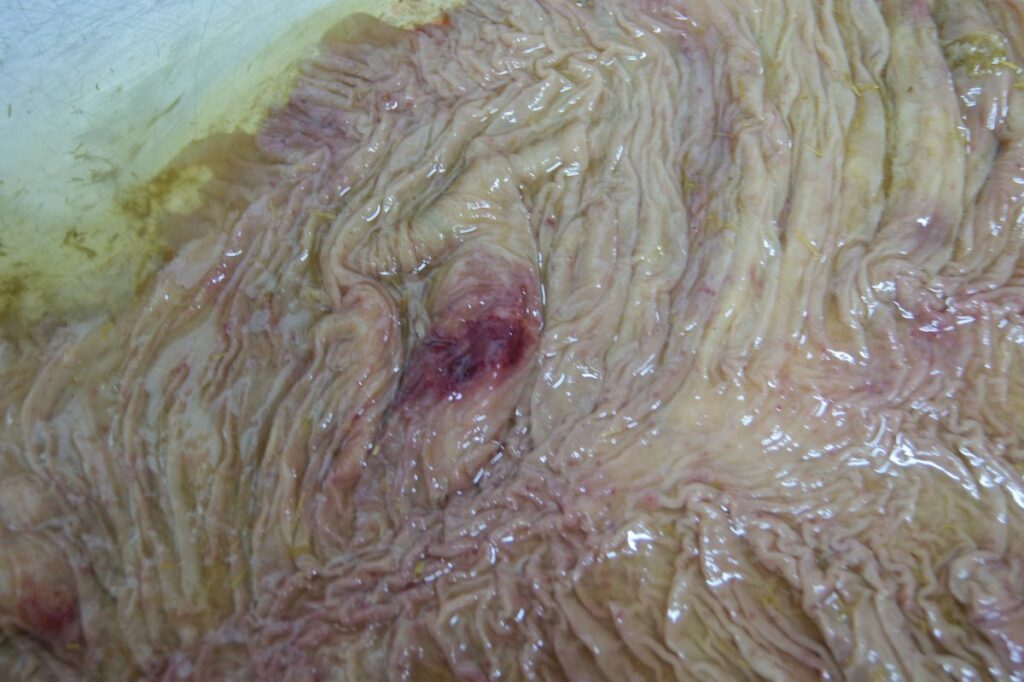
Colonic Ulcers
Why They Occur:
Colonic ulcers can be caused by excessive administration of non-steroidal anti-inflammatory drugs (associated specifically with right-dorsal colitis), or by prolonged provision of a sufficiently fibrous diet, especially in the face of the additional stress of performance and travel.
How They Affect Nutrition:
Colonic ulcers result in a failure to adequately absorb nutrients, as well as leakage of protein into the lumen.
How They Affect Performance:
Related clinical issues, of course, include poor weight and body condition, diarrhea and chronic colic. Less obvious symptoms of colonic ulceration may include abdominal discomfort, such as resentment to the tightening of a saddle or resentment to being ridden, short striding or resistance to turning, and more.
Other Causes of Malnutrition
- Diseases – Diseases that cause malnutrition include infiltrative or inflammatory bowel diseases such as eosinophilic enteritis and granulomatous enteritis, and neoplastic diseases such as lymphoma.
- Parasites – Parasites such as strongyle larvae feed superficially on the intestinal mucosa causing disruption and typhlocolitis, which is further exacerbated by areas of local trauma from the remains of evacuated larval pits. Severe cyathostominosis is likely to result in chronic diarrhea, malnutrition, loss of condition, and a cascade of health problems related to colitis and ulceration.
- Starvation – Feed deprivation has been shown to cause ulcers in the squamous mucosa of horses, which is due to repeated exposure of the squamous mucosa to high acidity (Andrews 2019).
How Malnutrition Affects Equine Performance
Performance horses have a demanding lifestyle and are routinely asked to compete at extremely vigorous levels, often far beyond what is asked of a normal horse. Due to their intensive workload, there is a lot of stress put on performance horses on a daily basis. Stressors that come with the lifestyle include travel, unfamiliar locations, exposure to unfamiliar horses, changing water sources, and altered feeding schedules. Poor nutrition only adds to the strain on a competitive horse’s entire system.
Exceptional performance in horses stems from having good energy, stamina and focus, and malnutrition has the power to suppress all three of these things. Here’s a little bit about why good nutrition is important for great performance:
- Energy – Because horses that compete, especially in speed disciplines, have high energy demands, many people feed popular sweet or complete feeds with the idea that these will help them to maintain weight and obtain the energy they need. However, most of these common grain feeds are too high in NSC (non-structural carbohydrates). Large grain-based meals can contribute to sugar highs and crashes that negatively impact focus and behavior. When it comes to the dietary needs required to fuel anaerobic (fast-twitch) exercise, there are three main nutrients of focus: protein, glycogen, and healthy fats.
- Stamina – Most performance horse’s caloric needs can be met with a combination of hay and grain. However, it is often better to replace grain with fat wherever possible. As previously mentioned, grain can cause a litany of problems from an excess of carbohydrates. Fat is more energy dense than carbs, therefore the horse will have more energy, for longer, with less feed.
- Focus – Healthy fats also play a significant role in equine performance. Fat can be used as a primary source of energy for slow-twitch exercise, allowing the horse to focus and expel energy for longer periods of time.
But again, a horse must be in good digestive health in order to obtain the full nutrition available in an appropriate feeding program.
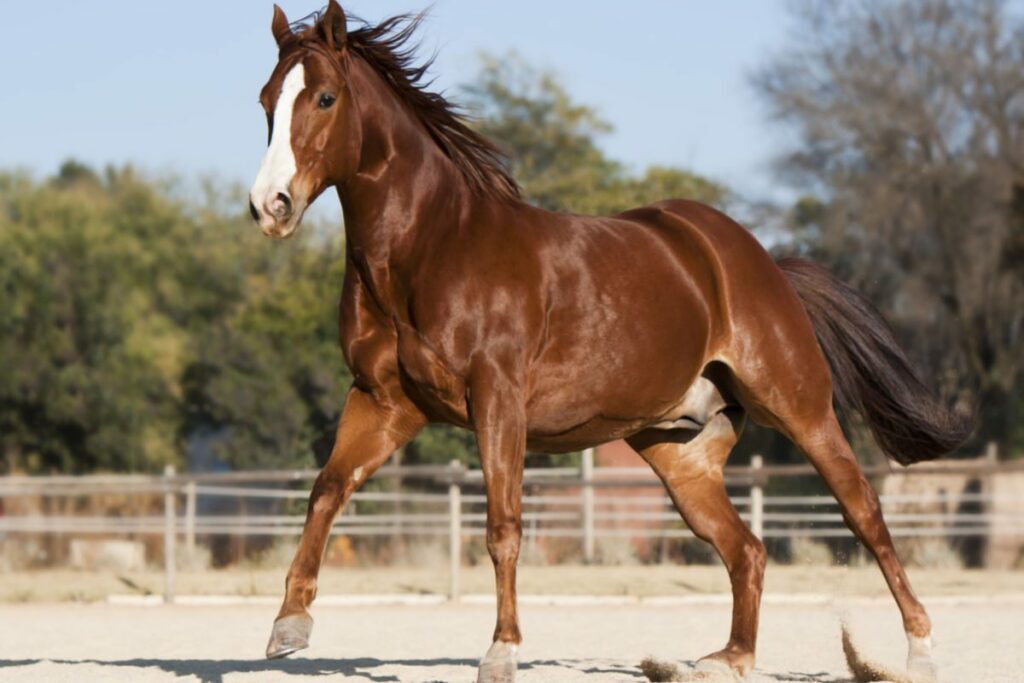
Malnutrition Affects the Entire Body
The Hooves
The hoof relies on protein, water, vitamins, and minerals for its structural integrity. If these elements cannot be appropriately absorbed or obtained from food, the structural integrity of the hoof is threatened. As the old adage goes, “No hoof, no horse.” Compromised hoof health will most certainly keep performance horses from running their fastest and competing to their best ability.
The Digestive System
The microbiota, or community of microorganisms within the GI tract that aids in digestion of food, can be easily thrown out of balance by a change in feed or poor nutrition. The imbalance can then cause an overgrowth of certain bacteria, ultimately leading to a condition called dysbiosis.
The overgrowth in some bacterial species typically leads to the massive die-off of others. As they die, bacteria release endotoxins and exotoxins, which can gain access to the bloodstream through the now-inflamed and permeable (“leaky”) intestinal wall. The circulating toxins drive systemic inflammatory response syndrome (SIRS) which can affect multiple areas of the body and their various functions.
The Immune System
The immune system is made up of several barriers throughout the body designed to keep good bacteria in check and bad bacteria out of the body. The imbalanced microbiota caused by malnutrition can lead to an overgrowth of bacteria and everything else mentioned above with the digestive system.
SUCCEED Helps Maximize Feed Bioavailability
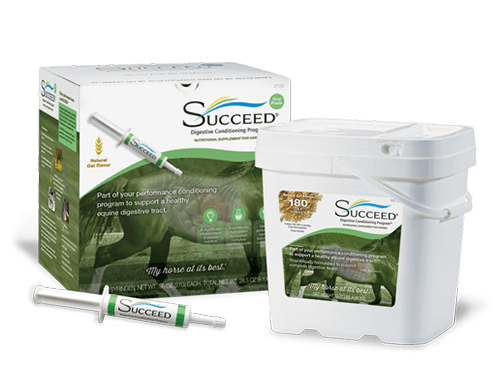
Performance horses need digestive support over and above appropriate feeding and management in order to maintain gastrointestinal health and function. SUCCEED Digestive Conditioning Program is a natural, nutritional supplement researched, tested, and proven to maintain the health of the entire equine GI system.
SUCCEED contains oat oil, specially processed to maintain a high concentration of polar lipids.
- This oil provides the horse with easily digestible calories, adds luster to the hair coat, and can help protect the gastric mucosa against acidic erosion.
- Even more importantly, polar lipids support the integrity of cellular membranes, which ensure tight junctions between epithelial cells in the GI mucosa. This strengthens gut wall impermeability, which provides an especially important natural defense against leaky gut.
Oat flour in SUCCEED is rich in beta glucan, and yeast products in SUCCEED provide a secondary source of beta glucan.
- This is a soluble fiber—a polysaccharide—that sequesters sugars and moderates their release.
- It has the effect of reducing postprandial glycemic peaks up to 50%, according to one study.
- Oats found in SUCCEED via oil and flour are also a good source of Biotin, which has been shown to support hoof health.
On top of this, the yeast products found in SUCCEED also help to support the microbiota. This support helps to prevent glutamine deficits, which can result in diarrhea, villous atrophy, mucosal ulceration, increased intestinal permeability, and even necrosis of the GI tract.
Bottom line—A horse cannot compete at peak levels unless the digestive system is in tip-top condition. Managing the horse’s GI health through good feeding and husbandry practices is the best method of maintaining a healthy horse from head to toe.
Test for the Presence of Ulcers with SUCCEED FBT
If you suspect your equine patient may have a GI condition, it’s important to start treatment right away and begin a treamtent and support regimen. The SUCCEED Fecal Blood Test (FBT) is a simple, stall-side test you can use at the beginning of a diagnostic work-up to detect the presence of stomach ulcers, colonic ulcers or other GI disease. The test identifies components of blood in your horse’s fresh fecal sample, pointing to a problem in the foregut, hindgut, or both.
Find this topic interesting?
Check out our white papers to learn more about the links between digestive heath and other systems. Download:
References
Andrews, Frank M. DVM, MS, DACVIM (2019) Equine Gastric Ulcer Syndrome. AAEP. https://aaep.org/horsehealth/equine-gastric-ulcer-syndrome


